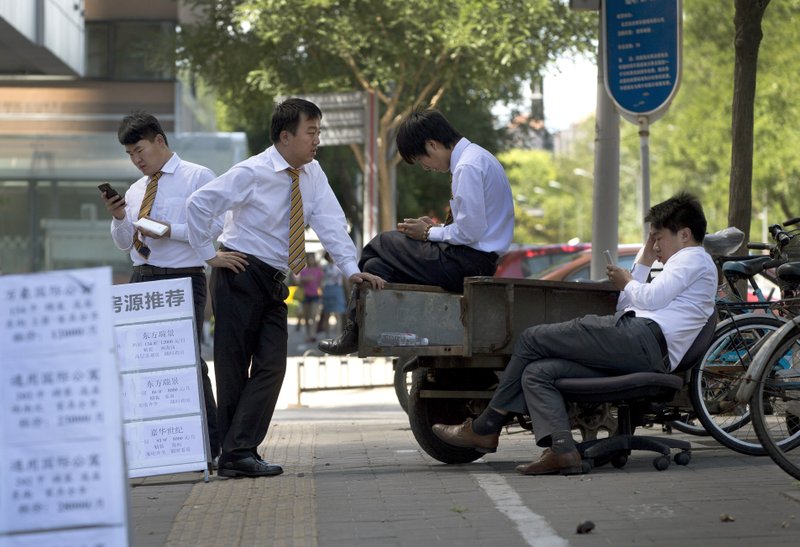BEIJING -- Six months ago, China's housing market was so red-hot that Feng Xiaowei, a sales manager at a real estate agency in the eastern city of Hangzhou, rarely took a day off.
Then lending and sales curbs imposed by the government to cool soaring housing costs started to bite and business evaporated. Now Feng and the seven salesmen he supervises spend the day playing cards.
"There are no buyers," said Feng, 24. "We take three days off a week. We go out for barbecue and play poker."
China's house prices have marched higher for 15 years, helping to drive an economic boom but making home ownership unaffordable for many families. Now a slump is dragging down economic growth that already was slowing. Some analysts worry that banks might be shaken if developers default on loans.
The slowdown should fit the Communist Party's ambition to nurture growth based on domestic consumption instead of trade and credit-fueled investment. But the timing is awkward, with demand for China's exports and growth in consumer spending both weaker than expected.
That is forcing the government of President Xi Jinping into a politically delicate balancing act. It wants to discourage speculative investment and increase supplies of low-cost housing without allowing prices to fall, which would alienate prosperous city dwellers, a pillar of ruling party support. Banks were ordered in May to prop up the industry with more lending.
"They don't want to get into a situation where prices are going into negative territory," said economist Brian Jackson of IHS Economics. "There are stability concerns related to that on the social side and also on the financial side."
Nationwide, sales fell 7.7 percent in the first quarter from a year earlier to $176 billion, according to government data reported by the official Xinhua News Agency. E-House China R&D Institute, a research firm in Shanghai, said the volume of unsold new housing in 35 cities rose in May to a five-year high.
Some buyers have staged protests after seeing developers cut prices of similar units in the same complex by up to 20 percent from what they paid months earlier.
In Hangzhou and another city, Nanjing, buyers who want a refund of the difference between what they paid and the current price stormed showrooms and smashed models of apartment complexes, according to Xinhua and other media. In Guangdong province, near Hong Kong, unhappy owners in one complex blocked entrances so customers couldn't see units being offered at lower prices.
Feng, the sales manager, said he used to sell at least two properties a month, in addition to those sold by his staff, but there have been no sales in the past month.
"There is just too much housing in Hangzhou," he said. "That's why the price is going down."
The boom took off in the late 1990s when then-Premier Zhu Rongji started selling housing owned by the government or state companies in which almost all urban Chinese lived.
Many families traded up to newly built apartments. Ancient neighborhoods of narrow lanes and one- and two-story homes in Beijing and other cities were demolished to make way for 20- and 30-story apartment towers. In the suburbs, farms were replaced by sprawling complexes of 5,000 and more units.
Sales drove demand for cement, steel, furniture and kitchen appliances. Within a decade, the majority of city dwellers lived in privately owned homes.
With few other investment options in China's state-dominated economy, families with money bought multiple properties. Spending was boosted further by the flood of stimulus money Beijing sent coursing through the economy after the 2008 global crisis.
Prices have risen so high that a 920-square-foot apartment in an average Beijing neighborhood can cost $725,000 -- the equivalent of more than 180 years of income for the average Chinese person.
Alarmed by complaints about soaring costs and warnings China faced a possible real estate bubble, leaders began tightening controls in 2010. They raised minimum down payments to as much as 70 percent of the purchase price and imposed quotas on how many apartments one customer could buy.
Prices that had been rising at double-digit annual rates started to decelerate this year. In May, surveys by real estate companies said prices slipped by 0.1 percent to 0.3 percent from April's level, the first decline in two years.
Su Xiaoling, a sales manager in Shanghai, bought an apartment in February for $300,000 as an investment.
"There might be some correction in the short term, but it does not mean I lose money as long as I do not sell it," said Su, 33. "I can wait."
Regulators say China's real estate slowdown is different from the U.S. crash in 2008. They say banks face little risk because mortgages are small and most buyers pay cash.
Private sector analysts warn, however, that real estate plays such an outsized economic role that any decline will rattle other industries.
Lending for mortgages or to developers is 20 percent of outstanding bank loans, and that share doubles if credit to construction and other related industries is added, according to Barclays economist Jian Chang.
Many investors think that China will not emerge from the property downturn unscathed, and some expect a "large credit event that could cripple the economy and financial system," said Chang in a report.
Business on 06/14/2014

